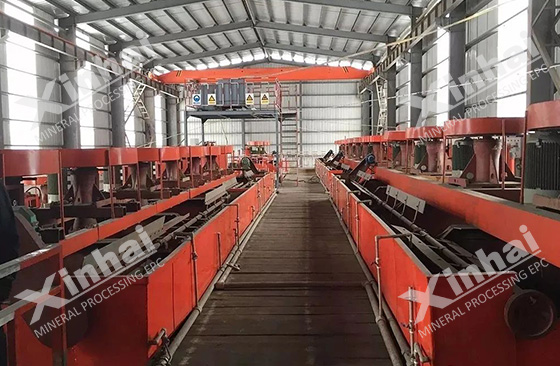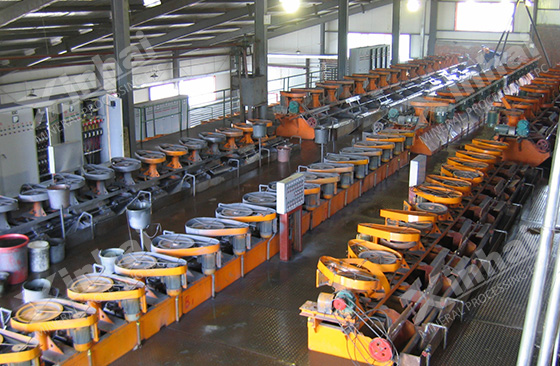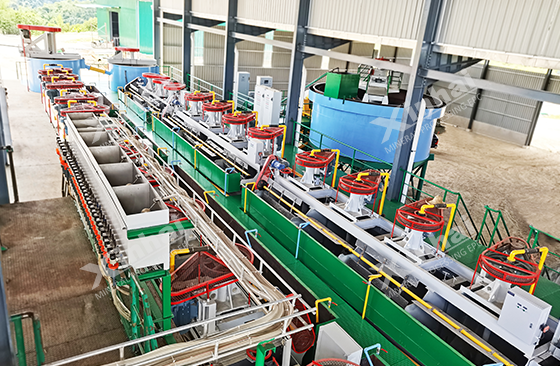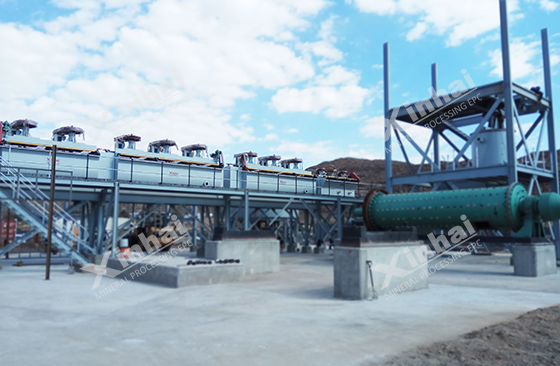
As an important metal raw material, copper ore is widely used in various industries because of its good electrical conductivity, thermal conductivity, ductility, strong stability and strong corrosion resistance. With the rapid development of the allergic economy, the industrialization process has been accelerated. The substantial rise of new technologies and emerging industries has increased the consumption of copper. This situation has exposed that the mining and supply of copper resources cannot meet the needs of contemporary industrial society. At present, the amount of single mineral resources is gradually decreasing, and it is necessary to increase the development and utilization of low-grade copper resources. Low-grade copper ore includes difficult-to-treat oxidized copper ores, sulfide copper ores and copper waste rocks. The traditional beneficiation method cannot effectively recover the concentrate from low-grade ores, so it is necessary to conduct beneficiation test analysis to determine the appropriate treatment process. The following will analyze the flotation method and chemical beneficiation method of low-grade copper minerals for you.

When processing sulfide copper ore , choose to strengthen the selection of high-efficiency collectors to ensure rapid flotation. When processing copper sulfide ore, grinding operations are carried out according to the ore conditions. At the same time, operations such as lime slurry adjustment and high alkalinity selection are also required. In addition, attention should be paid to the recovery of precious metals such as gold and silver. When processing porphyry copper ore, copper, molybdenum, gold, silver and other concentrates are obtained through mixed flotation and then purified and separated to obtain copper, molybdenum and sulfur concentrates. Nitrogen flotation is often used to process mixed concentrates, and copper and molybdenum can be separated by selection and re-grinding.
When processing high-sulfur copper ore, it is necessary to adopt a combination of preferential flotation and isotropic flotation, so that the middlings can be re-grinded and separated to obtain copper ore. According to the requirements of ore and production, mineral processing tests are conducted to obtain the required reagent types and dosages, the adjustment of the pH value of the slurry, and the specific operation of the flotation process. When copper ore has the characteristics of variable performance and high complexity, it is more difficult to recover the concentrate. The flotation of copper ore needs to consider the separation of copper and lead-zinc ore, which is mainly reflected in the process flow, reagent types and dosages.

When the refractory copper ores have high arsenic content, high oxidation rate, and complex occurrence states, the process of stage grinding, re-grinding of coarse concentrate, and re-grinding of selected tailings is adopted. The precipitant used in flotation is sodium sulfide, and sodium thiosulfate and ammonium chloride are combined as arsenic inhibitors, which can effectively separate copper and arsenic and obtain good flotation indicators.
Oxidized copper ore has the characteristics of complex properties, structure and composition ratio, which increases the difficulty of flotation, so it needs sulfide flotation method and fatty acid capture method to process. Sulfide flotation method has good selectivity and is a method commonly used by ore dressing plants.

Chemical mineral processing mainly refers to leaching method, which can be divided into in-situ leaching and heap leaching according to the characteristics of the process, and can be divided into acid leaching and alkaline leaching according to the difference of reagents.
1. In-situ leaching method is mainly a method based on heterogeneous minerals in natural environment, which can selectively separate useful ores.
2. Heap leaching method mainly involves placing the ore in an underground open area or in a surface waste rock area after mining.
3. Pool leaching method is widely used in high-grade copper ore and concentrated copper ore. It is generally a method carried out in the infiltration and stirring area, which is suitable for dispersed and multi-ore mining areas.
4. Acid leaching and alkaline leaching methods are mainly used for leaching of oxidized copper ore. The acid leaching process uses sulfuric acid as the main leaching agent, which is used to treat the leaching of oxidized copper ore containing acidic gangue minerals. The acid leaching process can extract copper from low-grade and waste rock piles. The main leaching agent of the alkaline leaching process is ammonium carbonate, which can be used to treat oxidized copper ore containing a large amount of alkaline gangue.

In summary, the beneficiation process of low-grade copper ore is complex and diverse, and it is necessary to select appropriate treatment methods according to the specific properties and composition of the ore. Through the rational application of flotation methods, chemical beneficiation methods and other technologies, the resource utilization rate of low-grade copper ore can be effectively improved, providing a strong guarantee for the sustainable development of copper resources. This not only helps to alleviate the pressure of copper resource shortage, but also has important significance for achieving sustainable development of resources. With the continuous advancement of technology, the beneficiation process of low-grade copper ore will become more mature and efficient in the future, providing a more stable supply of raw materials for industrial production.
To find out more about our products and solutions, please fill out the form below and one of our experts will get back to you shortly.